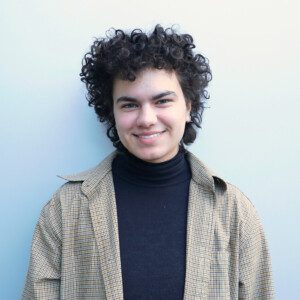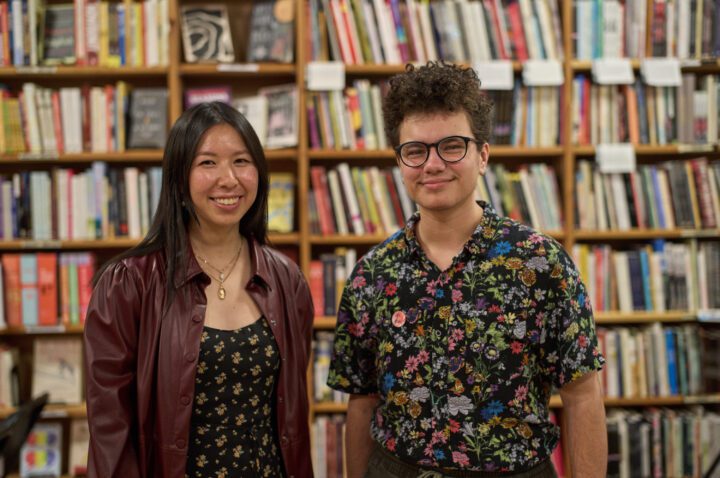
A Conversation with Mateo Acuña, 2023/24 Seattle Youth Poet Laureate
September 12, 2023
This month, we’re sharing stories woven with heart and light from our youth programs community. In the interview below, our 2023/24 Youth Poet Laureate Mateo Acuña shares the path to writing his first collection of poetry, where he finds inspiration, and what dedicated space and mentorship as part of the Youth Poetry Fellowship (YPF) program has meant in his writing journey. This interview has been edited for length and clarity.
What brought you to poetry? What has your writing journey been like up until now?
I can’t believe I’m saying this, but I only really started writing poetry six months ago! Like a lot of young people, I didn’t have any idea what it really was. My experience of poetry was through a 1,000-page Penguin book of romantic poetry that I bought for $1 at a bookstore that was closing. My understanding was that poetry had such flowery language, it was often from a white male gaze, and had to have sophisticated musings.
I joined my first writing group when I was 15 through the Auburn Public Library’s Teen Writers Group, led by the Auburn poet laureate, Susan Landgraf. She was my first mentor, and told us that poetry is like the base of prose. It’s prose in its finest and most distilled form. But for me, poetry was like eating vegetables, because I didn’t really like it and didn’t know what I could do with it. In that group, I wrote a poem that made no sense, full of mixed metaphors that nobody could understand, and I felt really discouraged. I thought, “I’m never going to write another poem again!” Fast forward a couple years, I’m now in college and took my first creative writing class last spring at Pacific Lutheran University with Professor Rick Barot. I’m starting to understand more about what poetry can be. In that class, I wrote this poem, “Ode to the Coyote,” which will be in my forthcoming book. That poem was my aha! moment. I know how to write poetry now! And I’m constantly learning, too. But that was the time I felt like I could translate my thoughts and ideas onto the page, and they had a form.
Can you share some themes, images, or ideas that frequently appear in your writing? What issues facing the public feel urgent to you to address in your work?
I’ve been focusing a lot on identity and heritage. I’m trying to be the representation I wished that I had when I was younger and that other people like me might need—whether they’re in the LGBTQ community, and especially BIPOC LGBTQ youth. We don’t have a lot of representation still. We’re starting to have more queer representation, but trans and Black and brown representation for youth is not as much of a thing still. So when I write, I have youth in mind a lot, even though anybody can benefit from reading the work of a young person. And I do think that adults need to diversify their reading practice by reading youth work, too. I think my poetry could be for anybody, if they’re open to the messages that I’m trying to set down. But my first book is going to be around identity and heritage. I feel like that really sums it up.
Who are the writers and artists you turn to? What are you reading right now?
I’m reading Chen Chen’s Your Emergency Contact Has Experienced an Emergency. It’s light and fluffy, like cotton candy—that’s what Chen Chen’s poetry feels like to me—but there are darker moments in there, too. His book inspires me to see all the different things poetry can be. I often approach poetry through a social activism lens, but it can also be a representation of culture and queer joy. I’m trying to broaden my definition of poetry at all times.
I’m also reading Octavia Butler’s Dawn and Ada Limon’s The Hurting Kind. I like a diverse reading list. Creative nonfiction, fiction, poetry, I’ll read anything that has words on it, even if it’s the back of a cereal box. [Laughs]
Can you describe your typical writing process and/or where you find inspiration?
I can talk about a poem I wrote recently called “Black Locust.” I was at my dad’s house, walking through my childhood backyard. There’s this big tree in the backyard, and when I was younger, I would make witch’s potions in the crook where the tree bifurcates. It’s also kind of a scary tree because it’s near the fence, and there was a dog on the other side that would bark, so I had to be brave to get to it. I always wondered what kind of tree it was when I was growing up. There was really no way to find out at the time, but now I have this app that can identify anything—trees, animals, plants, fungi. So the app identifies the tree as a black locust. And immediately I think, oh, that sounds spooky. I started learning about the history of this tree, and it has a very disturbing history within the colonization of America… and it was growing in my backyard the whole time.
I don’t want to say any more, because I want people to read the poem when my book comes out, but right now, my writing process is really research based. Knowledge is power, and that might sound cliché but it’s true. My environment, my surroundings are my inspiration: going to different parks in the area, being in nature, noticing the remnants of history that we sometimes think are all behind us, when it’s actually right under our noses, we don’t even see it.
Related to process, how do you take care of yourself, before, during, and even after the writing happens?
I used to think if I super glued my butt to a seat, I wouldn’t leave until I wrote the next great American novel. But I’ve learned that it’s a balance of allowing yourself to be inspired, but also shutting out the entire world and just sitting down to write something. It can be tricky sometimes, because if you write all the time, you’re going to be drained. But if you’re out all the time, sometimes you can lose that writing brain. So, that’s how I take care of myself. For me, writing doesn’t exist without living a life, and vice versa.

2022/23 Seattle Youth Poet Laureate Sah Pham and 2023/24 Seattle Youth Poet Laureate Mateo Acuña celebrate the release of Sah’s first poetry collection, LOVELIKE (Poetry Northwest Editions)
What inspired you to apply for the Youth Poetry Fellowship?
My partner told me about it! I’m from Auburn, we don’t really have poetry programs and we weren’t taught a lot of poetry except basic stuff like poetry rhymes. But Seattle is a vibrant literary city, and I think people who live in Seattle aren’t even aware of how many more opportunities exist here compared to the rest of the state. So if it wasn’t for my partner, I wouldn’t know about this program! I didn’t think I would get it, but he really encouraged and believed in me.
As the 2023/24 Seattle Youth Poet Laureate, you get a book deal through Poetry Northwest Editions! What can readers expect from your upcoming collection?
Without giving too much away, I would say it’s research heavy, but also very personal. It’s like a little piece of me, a little piece of my soul, looking out at the world. I think it’ll be transformative for people who might not be aware of some of the stuff I am addressing. That’s what I would say.
What does it mean for you to have dedicated space and mentorship to write, be creative, and share your writing?
Oh, man, it’s so important. The Auburn Teen Writer’s Group was a space where I realized my own potential—spaces like that, and the Youth Poetry Fellowship, can build you up, and they can also poke little holes in your logic, creatively. You realize what your strengths and weaknesses are. Also, having outside perspective and receiving the right kind of critique is so important to writing. Having space to write and be in a cohort with others helped me realize that I’m good at writing! I didn’t recognize it initially because, usually, writing was something I did by myself. It was just something I did for fun. You may not know your potential when you’re writing in solitude.
What role do you hope writing will play in your life in the future?
I see myself writing more poetry, for sure, and I also really want to publish my fiction book. I’ve just been experimenting with new forms of writing as well, like short fiction, creative nonfiction, and personal essays. I find a lot of enjoyment in [personal essays] because I feel like I’m chatting with a friend. There’s no need to worry about line breaks or wonder if this metaphor works. So I’m definitely going to continue writing, and hopefully pursue a master’s in writing.
Thank you, Mateo!
Mateo Acuña (he/they) is a Peruvian-American transgender poet, writer and artist studying at Pacific Lutheran University. He enjoys walking in nature, petting his cats, and making art that reflects the world around him. He splits his time between Auburn and Seattle, WA.